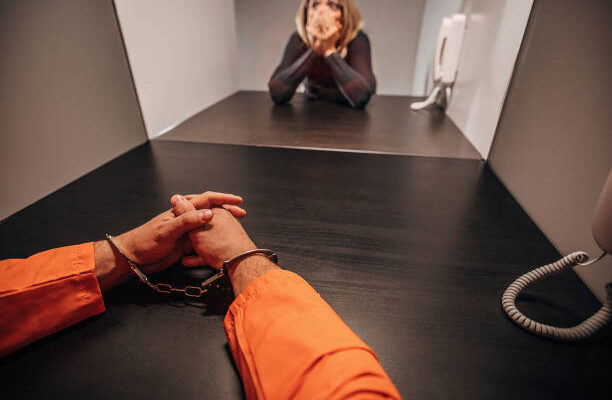Love and marriage are complex facets of the human experience, and for individuals who have been in prison, navigating these realms can be even more challenging. The journey of reintegration into society comes with its own set of hurdles, and building meaningful connections becomes an essential part of the process. In this article, we will explore the dynamics of love and marriage for those who have been in prison. Shedding light on the unique challenges they face and the transformative power of redemption in the realm of relationships.
The Stigma of Prison:
 (Photo from iStock)
(Photo from iStock)
One of the most significant challenges for individuals who have been in prison is overcoming the stigma associated with their past. Society often views ex-convicts through a lens of suspicion and mistrust, making it difficult for them to establish meaningful connections. Love and marriage, being deeply rooted in societal acceptance, can become elusive dreams for those seeking redemption.
However, it’s crucial to recognize that individuals who have served their time deserve the opportunity for a fresh start. Building healthy relationships requires understanding and empathy, qualities that society needs to cultivate to support the reintegration of ex-convicts.
Self-Discovery and Personal Growth:
Love and marriage after incarceration often involve a process of self-discovery and personal growth. Many individuals use their time in prison as an opportunity to reflect on their actions, learn from their mistakes, and develop a greater understanding of themselves. This introspective journey can lay the foundation for healthier relationships in the future.
Therapeutic Programs and Rehabilitation:
Correctional facilities are increasingly recognizing the importance of rehabilitation programs that address the emotional and psychological well-being of inmates. Therapeutic programs focusing on anger management, communication skills, and building emotional intelligence play a pivotal role in preparing individuals for successful reintegration into society. These programs not only contribute to reducing recidivism but also empower individuals to form more fulfilling connections outside of prison.
Building Trust and Overcoming Scepticism:
 (Photo from iStock)
(Photo from iStock)
Trust is the bedrock of any healthy relationship, and for those who have been in prison, earning trust can be a painstaking process. Open communication and honesty are crucial in building trust, allowing partners to share their experiences, fears, and hopes. It’s essential for both parties to approach the relationship with an open heart, recognizing that everyone deserves a chance at redemption.
Overcoming scepticism from friends and family can be another hurdle. Loved ones may express concerns about the potential risks associated with being in a relationship with someone who has a criminal history. Patience and understanding are key in addressing these concerns, as well as demonstrating through actions that positive change is possible.
The Role of Support Systems:
Having a strong support system is integral to the success of any relationship, especially for individuals who have been in prison. This support can come from family, friends, or community organizations that specialize in helping ex-convicts reintegrate into society. A supportive network not only helps individuals feel more secure in their relationships but also provides a safety net during challenging times.
Understanding the Impact on Intimacy:
Intimacy in relationships can be affected by the experiences of incarceration. Both partners may carry emotional baggage, and issues such as trust issues, fear of vulnerability, or post-traumatic stress can arise. It’s crucial for couples to communicate openly about their feelings and seek professional help if needed. Intimacy, when approached with patience and understanding, can become a powerful tool for healing and connection.
Legal and Practical Considerations:
Love and marriage for individuals with a history of incarceration also involve grappling with legal and practical considerations. Certain restrictions, such as parole conditions or limitations on travel, can impact the freedom of individuals recently released from prison. Navigating these challenges requires a commitment to compliance with legal obligations and finding creative solutions to overcome practical hurdles.
Celebrating Success Stories:
Despite the challenges, many individuals who have been in prison find love and build successful marriages. Celebrating these success stories is crucial for changing societal perceptions and highlighting the transformative power of redemption. By showcasing examples of individuals who have overcome their past and built meaningful lives, we can inspire others to believe in the possibility of love and marriage after incarceration.
Conclusion:
Love and marriage after incarceration are complex journeys that require patience, understanding, and a commitment to personal growth. Society plays a crucial role in fostering an environment of acceptance and support for individuals seeking redemption. By acknowledging the challenges and celebrating success stories, we can contribute to breaking down the stigma associated with incarceration and create a more compassionate and inclusive society where love knows no boundaries. In the end, the journey of love and marriage after prison is a testament to the resilience of the human spirit and the transformative power of second chances.
In the broader context of love and marriage for those who have been in prison, it’s essential to recognize the impact of systemic issues such as over-policing, racial disparities, and socio-economic inequalities. Many individuals find themselves caught in a cycle of incarceration due to circumstances beyond their control, and addressing these root causes is crucial for fostering lasting change.
Additionally, the role of education and vocational training within the prison system cannot be overstated. Equipping individuals with the skills and knowledge needed for meaningful employment upon release significantly enhances their chances of successful reintegration into society. This, in turn, positively influences their ability to build stable and fulfilling relationships.
Furthermore, community involvement and engagement play a pivotal role in creating an environment of acceptance. When communities actively support the reintegration of formerly incarcerated individuals, they contribute to breaking down barriers and facilitating the establishment of meaningful connections.
In conclusion, the journey of love and marriage after incarceration goes beyond individual relationships. It’s intertwined with societal attitudes, systemic reforms, and community support. By addressing these aspects comprehensively. We can pave the way for a more inclusive, compassionate. And supportive society where everyone, regardless of their past, has the opportunity to experience the transformative power of love.




